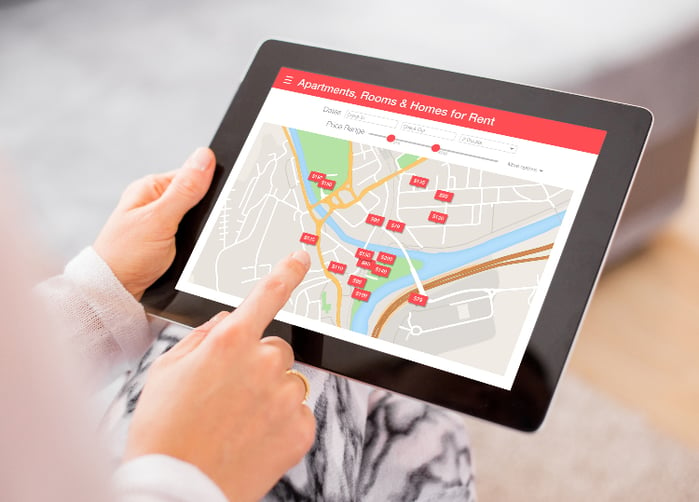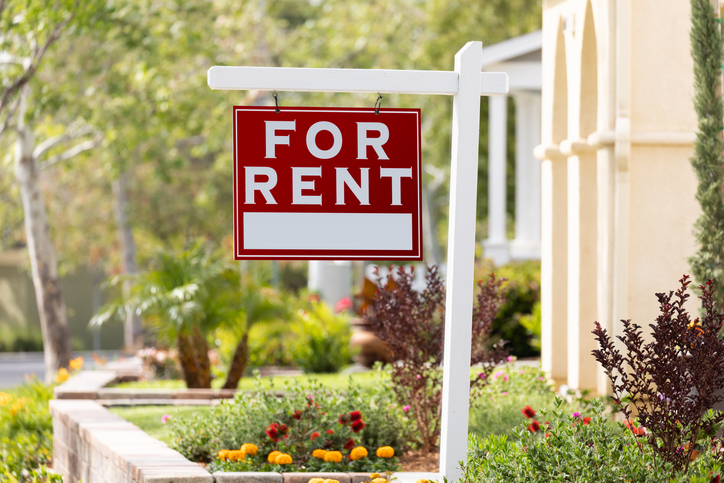50,000 single-family homes were added to the rental market last year, according to GlobeSt.com, but demand for houses to rent is still outpacing supply.
If you’re like many homeowners, you may be thinking about renting your house to generate cash flow and profit from the tax benefits that real estate investors enjoy.
Keep reading to learn more about how to rent your house and tips for making your rental property as profitable as possible.
Rent Your House in 9 Easy Steps
Once you’ve decided to turn your home into a rental property, you’ll need to put together a business plan and P&L (profit and loss) forecast. You can do that by following these nine easy steps to rent your house:
1. Research the market rent
Start by working on the income side of the P&L first and put together rent comparables. Rent comps tell you what the fair market rent is of homes most similar to yours in the same area or neighborhood.
A good resources for finding rent comparables online is Rentometer. You can also look at sites such as Zillow, Realtor.com, and Craigslist to learn how much homes near yours are renting for.
2. Determine your operating expenses
Now that you know what your income is likely to be, the next step is to calculate the operating expenses of renting your house. If you’ve been living in the home for some time, you already have a good idea of how often things break, the cost of making repairs, and other routine expenses like landscaping.
Items to include on the expense side of your P&L include:
- Repairs and maintenance
- Landscaping
- Property taxes
- Mortgage payment (P&I)
- Homeowners insurance with extra landlord coverage
- HOA fees (if applicable)
- Property management
The only expense you may not be familiar with is property management. Even if you plan on living near the home you are renting, it’s still a good idea to hire a professional property manager to deal with the tenant and the daily details of the property.
A good property manager understands tenants and how rental property management works, and will also make sure all state landlord-tenant laws and the Fair Housing Act are followed. Property management fees vary by market but generally run between 8% - 10% of the monthly rental income.
3. Review your profit margin
At this point, it’s time to do some quick number crunching to make sure you’ll turn a profit by renting your house. In most cases renting a house will be profitable, but there are some properties that can be difficult to rent, or that won’t generate enough rental income to cover the operating expenses.
In general, houses that are average for the neighborhood make good rental homes. For example, if your place is a 3-bedroom, 2-bath house and the majority of the other homes are too, you’ll probably have no problems finding a qualified renter quickly.
On the other hand, if your home is bigger or smaller than other homes in the neighborhood, it could be harder to rent. That’s because potential tenants already have a good idea of what the size and going rents are in an area. If your rent is too high due to the home’s size or doesn’t have enough square footage, renters will pass over your place and look at other homes for rent.
4. Make needed repairs and upgrades
Once you know you’ll turn a profit by renting your house, make any needed repairs and upgrades that will reduce maintenance expenses and justify a higher asking rent. You may want to hire a professional property inspector to go through your home, then fix the items that show up on the report.
Upgrades you can make to help maximize your rental income include:
- Durable flooring and carpeting designed for rental properties.
- Energy-efficient appliances that match one another.
- Repainting every room in the house so that your entire home looks bright and fresh.
- Install smart home devices such as Wi-Fi smoke and carbon monoxide alarms, programmable thermostats, and smart locks.
- Improve the curb appeal of your house by updating the landscaping with drought-resistant plants and an in-ground watering system.
These upgrades cost money, but the good news is that by turning your home into a rental property you’ll be able to enjoy the same tax benefits that real estate investors do.
To accurately track all of your rental property finances, visit Stessa to learn how rental property investors maximize revenue through smart money management and automated income and expense tracking.
5. Talk to your insurance agent
You already have a standard homeowners insurance policy on your home. But when you rent your house, you’ll also want to add additional landlord liability coverage.
An additional landlord insurance policy helps to protect you against someone’s medical bills or legal expenses if they are injured on your property and you are found responsible and for other items such as vandalism and burglary.
6. Hire a property manager
There’s a big difference between being a passive real estate investor and a hands-on landlord. Property management companies generally charge a monthly fee equal to 10% of the rental income. While it can be tempting to cut corners and save on the management fee, it can cost you more in the long run through higher tenant turnover or handymen charging you more because you’re an individual investor.
Property management companies already have an established network of cost-effective contractors and handymen, and will pass those savings along to you. Rental management companies deal with tenants every day, so they know what it takes to keep tenants happy, collect the rent on time, and renew the lease year after year.
When you interview prospective property management companies for your rental property, be sure to ask about things such as the fee structure, any extra charges, how many properties they manage similar to yours, and what their average tenant turnover and occupancy levels are. Roofstock is a great place to find a vetted property manager for your area to save you time and give you peace of mind.
7. Market your house for rent
Online tools are the number one way that renters shop for a new home, according to Zillow. In fact, between 80% and 90% of Generation Z, Millennial, and Generation X renters are most likely to use online resources as a whole.
Marketing your house for rent online is a good way to find qualified tenants quickly. Rental listing websites such as Rent.com and Rentberry literally reach millions of verified tenants each month through their syndicated listing services.
8. Screen tenants
The best rental listing websites also let you screen tenants while having the prospective tenant pay the screening fee.
Thorough tenant screening includes completing a rental application online and running reports such as credit and background checks, eviction history, rental history reports, and employment verification.
9. Write up a lease
Some rental listing websites let you write and sign the lease agreement entirely online. If you’ve hired a property manager, they already have a rental agreement that conforms to local and state laws, with additional addendums such as no-smoking and roommate clauses to help protect the value of your home.
If you decide to write up your own lease, websites such as eForms and ezLandlordForms have free lease agreement templates.
As a rule of thumb, it’s a good idea to collect as large a security deposit as your local law allows. The more money a tenant has to pay to move in, the less likely they are to damage your property. Plus you’ll have extra protection in the event there are damages caused by the tenant beyond normal wear and tear.
The legal resource website Nolo.com has a chart of security deposit limits for each state. In most states, the maximum security deposit a residential landlord can collect is an amount equal to one or two months of rent.

Best Rental Listing Websites
Rental listing websites help you market your vacant home online to find a qualified tenant as quickly as possible. You can significantly increase your exposure compared to just using a yard sign or the MLS, syndicate your listing across all major real estate websites, and benefit from tenant screening services, lease preparation, and automated rent collection.
The best rental listing sites include:
- Apartment Finder with over 50 million monthly renter visits.
- Avail is a one-stop rental listing and property management website.
- Cozy lets you compare applicants side by side, screen tenants, and collect online rent payments.
- Homes.com is a good website to use to find tenants looking for a single-family home to rent.
- People With Pets helps you find qualified tenants for a pet-friendly rental.
- Realtor.com rental listings receive an average of 18 inquiries within the first two weeks.
- Zillow Rental Manager provides a full suite of rental management tools and receives over 34 million visitors each month with rental listings syndicated across Zillow, Trulia, and HotPads.
Top Tips for Renting Your House
Renting your house out isn’t the right decision for every homeowner. While the additional income is always nice, there are a number of factors to consider as well:
- Decide if you want to be a hands-on landlord or hire a property manager to take care of rent collection, tenant communication, and repairs.
- Plan on preparing your house for renters, including having a professional property inspection done and making any needed repairs.
- Update your property with items such as new matching appliances and smart home features that can help you maximize the monthly rent.
- Market your vacant home online to reach as many qualified renters as quickly as possible.
Track all of your rental income and expenses, store documents online, and learn how to make your rental property more profitable by signing up for a free account with Stessa.












